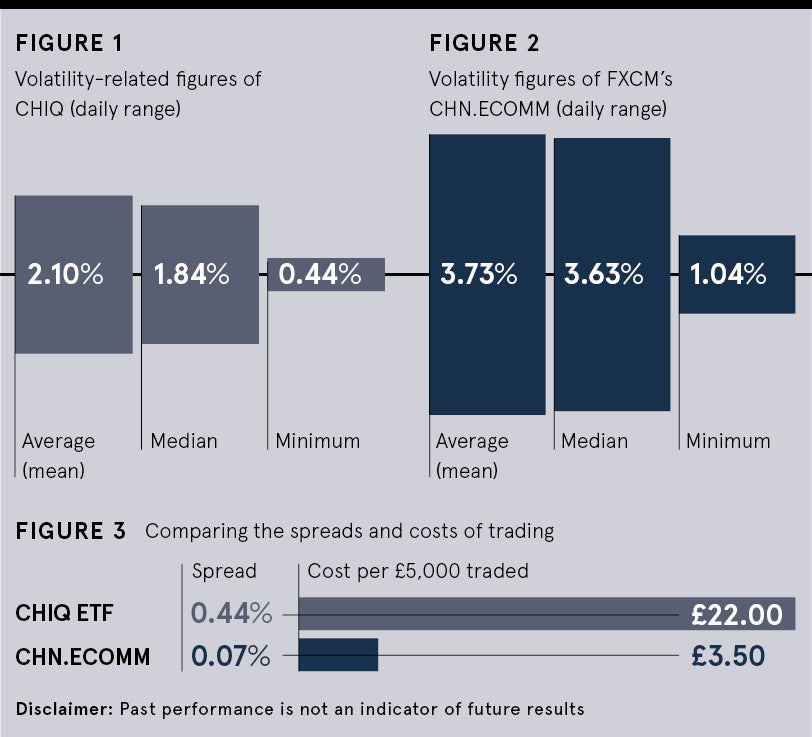
Michael Kamerman, FXCM
Investors, avert your eyes. This is for the traders among us. For years, if you wanted to trade an opinion on a particular industry, sector or geography, your vehicle of choice was exchange-traded funds, or ETFs. They are transparent, relatively cheap and allow high-level opinions to be traded in a single product.
But, they’re not for trading. Let me explain. ETFs are funds, which generally means there are large numbers of instruments within the instrument. Funds seek diversification, which smooths out returns. As a trader, are you looking for smoothed-out returns or short-term jolts in the market?
If you are a trader, you want focus, not smoothed-out returns due to diversification. Let’s go through an example. Say you want to try to profit from a rising ecommerce sector in China. You begin your search with China-focused ETFs. You peruse ETF websites, sift through “screeners”, read up on proprietary ETF rating systems to settle on a handful of options. Then you have to learn about weightings. Will this product actually move in correlation to my opinion?
You found your ETF: the Global X MSCI China Consumer Discretionary ETF, or ticker CHIQ. It’s one of the world’s largest China-focused consumer discretionary ETFs. It has 60-plus components. Since you are a trader, you want volatility (see Figure 1). Does it move?
In our view, trading stock baskets through a global broker such as FXCM offers significant advantages
Now, as a smart shopper, you consider alternatives. Enter FXCM’s stock baskets. FXCM has six proprietary stock baskets focused on China ecommerce, China tech, esports and gaming, US Big Tech firms (FAANG), biotech and cannabis.
Since you are interested in Chinese ecommerce, we focus on that stock basket. The basket has a straightforward equally weighted structure of only five components – Alibaba (BABA); Trip.com (TCOM); JD.com (JD); Pinduoduo (PDD); Tencent Music (TME). Compare these volatility figures (see Figure 2) to those in Figure 1.
So as a trader, there are some obvious conclusions about volatility. The FXCM stock basket CHN.ECOMM was 77 per cent more volatile on average in 2020 than its ETF counterpart CHIQ. Why? The stock basket counts on five of the largest stocks instead of 60-plus. The greater the stocks in the product, the less volatility generally.
Then you ask about costs. Surely stock baskets are more expensive given the economies of scale and size of the ETF market? Wrong.
Let’s take the obvious cost of paying the spread, the difference in the bid/ask price when opening a trade (see Figure 3 for a comparison of their spreads).

In our view, trading stock baskets through a global broker such as FXCM offers significant advantages. Not only do they provide a straightforward concept to begin trading, but the right product with the right weighting can potentially result in better trading opportunities than comparable ETFs.
For more information please visit FXCM.com
Disclaimer
Contracts for difference (CFDs) are complex instruments and come with a high risk of losing money rapidly due to leverage. Some 73.05 per cent of retail investor accounts lose money when trading CFDs with this provider. You should consider whether you understand how CFDs work and whether you can afford to take the high risk of losing your money.
Forex Capital Markets Limited is authorised and regulated in the UK by the Financial Conduct Authority. Registration number 217689. Registered in England and Wales with Companies House company number 04072877. For more information about FXCM and the risks associated with trading please visit www.FXCM.com/UK
The comparisons are based on data derived and spread percentages are taken from www.etf.com/CHIQ on June 11, 2020. Data provided in the table is from the period January 2, 2020 through June 11, 2020.
The information on this material is not intended as investment advice and must not be construed as such. Seek advice from a separate financial adviser.






